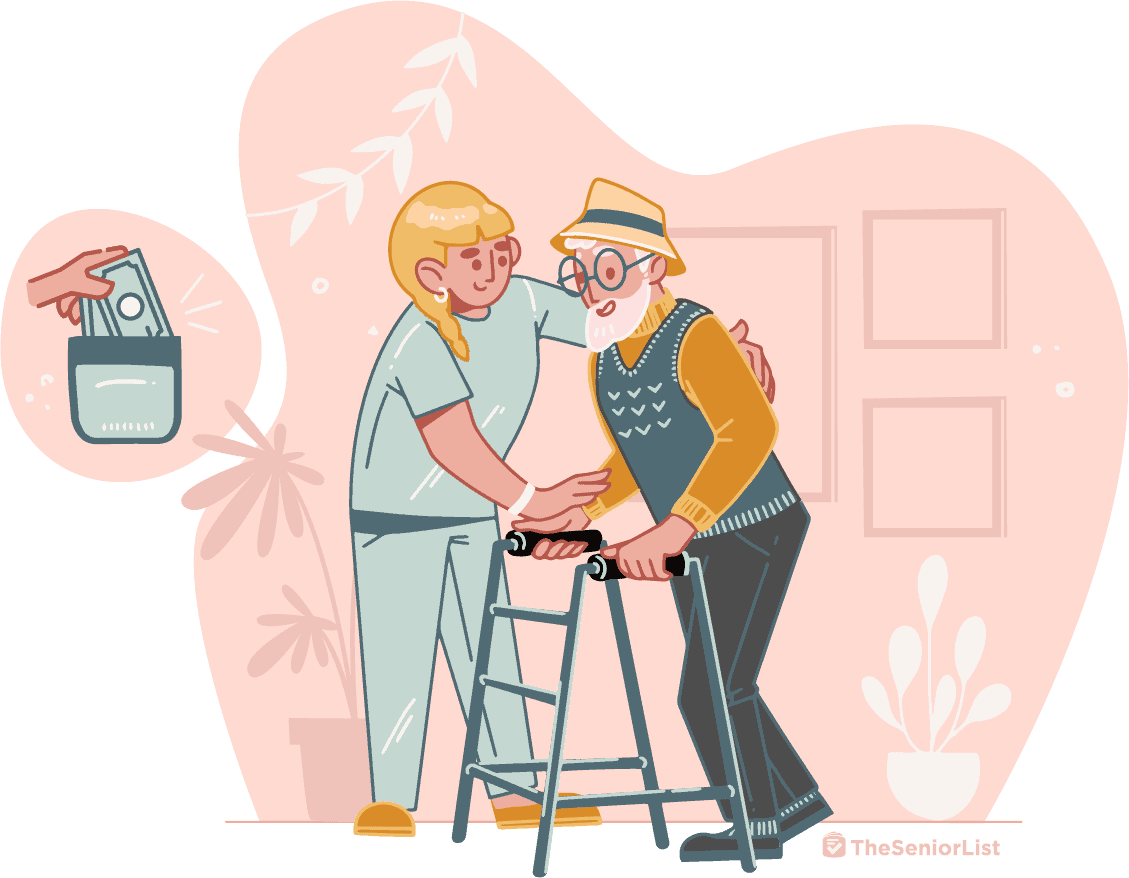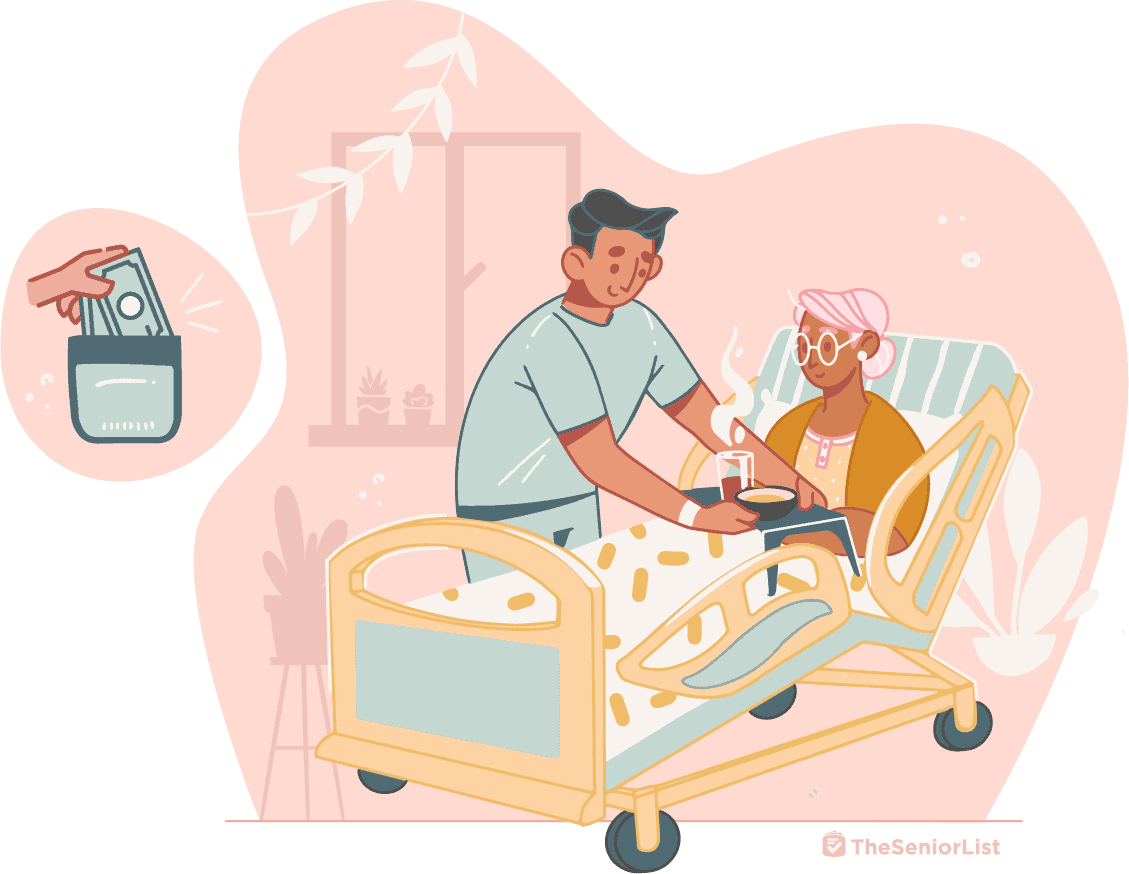How Much Government Pay for Caring for Family
Nearly every land offers some form of pay for family caregivers; however, each of them has different criteria for this fiscal support. Making matters more complicated, funding for family caregivers can come from a variety of sources, including Medicaid state plans, employer-paid leave programs, home and community-based services (HCBS), and self-directed programs.
Eligibility and pay for family unit caregiving may vary from land to state, so it's best to reach out to your state'south health or Expanse Bureau on Crumbling for more than data. In this article, I'll go over some of the mutual funding sources and services that can help family caregivers.
Pro Tip: Medical alarm devices aid provide peace of mind to both caregivers and individuals that need assistance with daily living tasks. To learn more about this technology, check out my picks for this year's best medical alert system.
Medicaid Programs for Family Caregivers
Unfortunately, not all states provide compensation for family caregivers, and there might be limitations to receiving certain benefits. While the cost of unpaid caregiving is valued at $470 billion, there are all the same many ways family caregivers can utilize for dissimilar programs and receive financial assistance for caring for a loved one.

Medicaid State Plans
Family caregivers can receive financial assistance and respite care through certain Medicaid country plans. However, the level of assistance and eligibility for such programs may vary beyond states, and all involve an application process. The all-time way to discover out if your state has Medicaid benefits for caregivers is to reach out to your local eligibility office directly.
At that place are some states that may give family caregivers the pick of choosing self-directed Medicaid services, which offer more freedom and flexibility regarding care options. A few such options include the Community-Based Services Waiver Program and self-directed personal assist services state plans.
Home and Customs-Based Services
According to Medicaid, HCBS provides Medicaid beneficiaries the flexibility of receiving services in a domicile or community setting instead of a nursing dwelling house or other institution. The programs offer personalized care and assistance to specific groups, such as individuals with disabilities or those who need help with everyday tasks such as bathing and taking medications.
This program does accept some limitations and challenges, including the fact that 24/vii assistance may non ever be bachelor; farther, due to high demand, there may not exist adequate numbers of qualified caregivers. To employ for HCBS or other waivers and programs, reach out to your state's respective Medicaid office.
Community Kickoff Pick
Customs Offset Selection, or the 1915 (k) state plan choice, is a Medicaid plan that was created under the Affordable Care Deed. This option provides state home and community-based personal bellboy services for those eligible for Medicaid state plans. A full of nine states — including California, Montana, Maryland, Oregon, and Texas — have implemented the Cfc option in contempo years.
Co-ordinate to the American Council on Aging, this program provides both long-term intendance, as well equally the option to utilize for self-direction services. The goal of the latter is to help shift the resources and direction away from long-term services to more personalized, dwelling house and customs-based services. For instance, Texas has offered Community First Choice as a country choice since 2015.
Chlorofluorocarbon is available for those who are eligible for Medicaid, require an institutional level of intendance, and need help with daily living tasks such as bathing, eating, and dressing.
Did You Know: In that location are many types of caregivers. For instance, family caregivers include a family unit member or a friend that is willing to step up and intendance for their loved ones. Read my commodity on quality in-dwelling intendance to learn more.
Self-Directed Personal Assistance Services
According to Medicaid, self-directed personal help services (PAS) are "personal care and related services provided under the Medicaid country plan or 1915(c) waivers." Cocky-directed services usually hateful that the private or representative has authority and personal responsibility for services. They as well assume responsibility for all aspects, including training and managing.
Under PAS, individuals are given a budget plan and service plan using a "person-centered and directed process," according to Medicaid. In terms of limitations, states tin can unremarkably target those who are already receiving waiver services or limit the number of individuals who choose to self-direct their PAS.
Pro Tip: The key to effective dwelling house care is to make certain your space is safe. Read my guide to home modifications for seniors to learn how to forestall falls and other injuries.
Medicaid State-Directed vs. Self-Directed Care
Medicaid currently provides health coverage to over 74.2 million Americans, including depression-income adults and children, aging adults, and individuals with disabilities. According to Medicaid, this federal health coverage plan is funded past states and the federal authorities. As a caregiver, you might wonder whether information technology'south more beneficial to cull betwixt Medicaid state-directed or self-directed care, which gives individuals more of a say in how services are administered, besides equally the level of care.
For example, cocky-directed care enables the professional or family caregiver to have freedom and control over services. They are in charge of assessing, hiring, evaluating, and determining the level of care required — without a middle man.
On the other paw, Medicaid state-directed care gives more than control to state agencies and intendance organizations. It unremarkably involves services or payments that are handled or overseen by a state agency or health-care organization.
Each type of care has its own benefits, so it's important to counterbalance the pros and cons to determine whether you would prefer making decisions over services or would rather take an bureau stride in and oversee them.
| Medicaid Country-Directed Care | Self-Directed Care |
|---|---|
|
|
States That Pay Family Caregivers
Several states offering some form of bounty, benefits, or support to family caregivers under qualifying circumstances and eligibility factors. For instance, California, New Jersey, New York, Washington, Oregon, and Hawaii are a few of the many states that pay family caregivers and provide ongoing caregiving resource and back up.
On boilerplate, many states with paid family unit caregiving incentives can provide anywhere from $600 a week to $1,000-plus in family leave support. In detail, California is a standout state when it comes to supporting family caregivers. For case, the California Paid Family Leave Act provides benefit payments to those who temporarily get out a task to care for a seriously ill loved one.

Additionally, California employees tin can receive upward to 60-seventy per centum of lost weekly earnings between five to 18 months before the merits start date, co-ordinate to the Employment Development Department for the State of California. The land also has a unique program known as Family unit Caregiver Services, which helps coordinate services for respite care as well as in-domicile or out-of-home assistance. These services are provided to adult family members or informal caregivers who are eighteen or older and provide care to individuals who are threescore or older.
Did You Know: Did you know that many states will pay for respite care? To learn more, read my guide: What Is Respite Care?
Other states, similar Nebraska, also offering support programs for caregivers such as the Lifespan Respite programme, which provides up to $125 per client, per calendar month. The program helps pay for respite services and relieves a family caregiver for a brusk period. Interesting tidbit: Research has shown that New Jersey is the best state for alive-in caregivers — with a median salary of $55,660 (as of 2020), co-ordinate to this Zippia report.
While near states do offer support for family caregivers, some states accept certain restrictions regarding plan eligibility. For instance, while Florida offers caregiver support, the land provides certain limitations for self-directed intendance.
Getting Started
Family caregivers play a vital role in the wellness and wellness of aging adults and individuals with disabilities. With then many land and federal resources and programs at present offering monetary assistance, caregivers take even more than options to choose from when it comes to providing quality care. Depending on the state and location, paid family unit caregiving benefits — forth with ongoing support and respite care — can help alleviate a lot of the financial stress many caregivers feel.
To larn more about caregiving, be sure to read my all-purpose guide to caregiving.
State Pay for Caregivers — Oft Asked Questions
- Does the government pay for family caregivers?
Through Medicaid and VA benefits, many states pay family members to care for their loved ones; even so, restrictions and payment amounts vary greatly by location.
- Can a family member get paid for taking care of a family member?
In near states, you can receive payment from Medicaid to care for family members; even so, this care is ofttimes restricted to adult children, although in some cases, it is extended to spouses.
- Tin can a wife get paid for taking intendance of her husband?
Currently, New Jersey, Rhode Isle, New York, California, and Washington offer means through which a person tin can receive payment to treat their spouse.
- How can I get paid for taking intendance of someone?
To get paid past the state for intendance, you can do so through Medicaid, other state programs, or VA benefits. To become started, yous'll want to contact your state's Medicaid function.
Source: https://www.theseniorlist.com/caregiving/caregiver-funding-by-state/
0 Response to "How Much Government Pay for Caring for Family"
إرسال تعليق